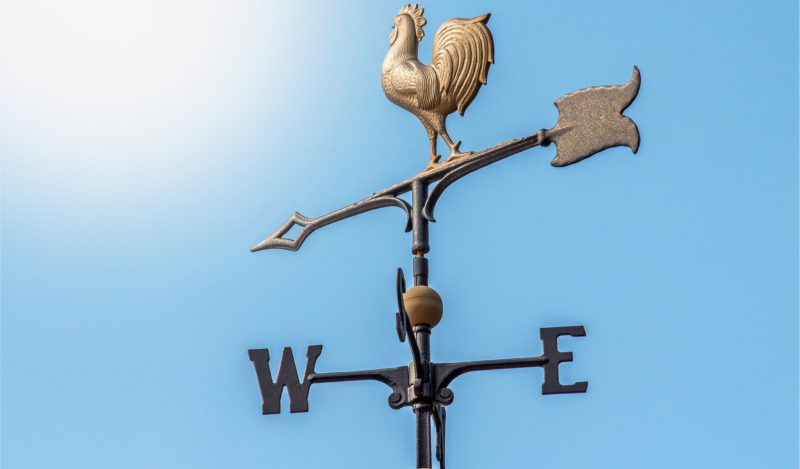You might think Covid-19 policy divides into people you agree with and people you don’t, but often there are persuasive pundits who change your mind, or alternatively people with whom you are in partial agreement.
Instead, I think a key distinction is people who have their own opinions (some are right, and some are wrong) and those who blow in whatever direction the wind is blowing. The weathervanes. I believe that Covid-19 weathervane pundits are a real problem. Without a doubt, people on the wrong side of policy issues— the pro-school closure, pro-masking toddlers, ignore vax-induced myocarditis, pro-lockdown, Zero-Covid zealots—harm other human beings, but weathervanes do too. Weathervanes stifle debate. They prevent dialog and halt progress.
What is a weathervane? You will recognize them— they are frequently on TV news giving updates on the pandemic. These are people in biomedicine, who may even have fancy titles and lofty ranks, and they are good at averaging what people think, and offering that point of view. Their method is simple: read the mainstream news outlets, closely follow academic Twitter, and average the opinion of people they see. Of course, they are averaging the last few days, so they are always a lagging indicator of sentiment among the media and elites.
Weathervanes often have similar characteristics. First, they self-identify as ‘science communicators’ and less often as ‘scientists.’ Some have published papers, but these are often unoriginal and plodding. Rarely, in their scientific work have they held a position or stance against others in their own field or discipline. Almost never has their work taken place on a controversial issue, in the midst of a scientific debate. I will return to this.
They may even have risen high in the academic ranks. If you average everyone’s opinion and say it as if it is yours, then you generally please people, and that is the hallmark of a rising administrator!
But they are fundamentally not able to read primary literature and process it themselves. They betray themselves by always talking about a new study— for instance the CDC’s study on diabetes rates in kids post-Covid-19— using only the terms/findings presented in the media the day before. That’s because they haven’t read the actual paper! You will never see them dismantle the paper like this because they don’t read primary papers, and they don’t know how to interpret it themselves.
They go on TV and say what the TV was saying 3 days ago, averaging the sensational op-eds with the mundane, the daring news coverage of Europe with the fear-mongering coverage within the New York Times. The net result is that they tell the news anchor what they expect to hear. They play to the crowd. A few people dislike them, but no one finds the middle that objectionable.
But by doing this, they prevent debate and dialogue. They make it seem that both sides are extreme, and they are a compromise. But compromise is different than averaging. And the truth might fall in the middle, but sometimes it lies at one end or the other.
Just consider schools. Weathervanes were total failures on this issue. Because they did not understand what data was needed to say schools are safe, they just said useless things, “Schools should open before bars.” Of course! That is an insipid talking point that few people would disagree with, but how about a real question: should schools open now? Is it safe? Do they need HEPA filters? Did Sweden need them in 2020? Are US schools different from Sweden, if so how? Are the differences salient? Do kids need to wear masks? If so, at what ages? Indoors or outdoors? and why? What evidence supports that claim?
“Most scientists agree that masking kids is part of a multi-layer strategy to keep kids safe….”
“Do you actually know the data or are you going to keep weathervaning?”
Simple questions are beyond their comprehension: what is the IFR in healthy kids? — Oh, I’m sorry, you cannot use the garbage meta-analysis you saw a figure from Twitter that forced a point-estimate despite heterogenous studies performed globally in hjghly disparate settings with disparate testing and after exclusions for no reason other than naked, personal bias with an I^2 of 100%, lol, not that one.
[PS: have you ever performed meta-analysis? Do you know what RevMan is? Actually, perhaps I should back up: do you know which questions and which data are suitable for meta-analysis and which results should be summarized differently? Oh dear!]
Imagine forcing them to answer: what do you think the best, current estimate of IFR is in kids in our nation who are healthy? Do you know? Weathervanes have no idea how to even approach these questions. If alone in a room with all of Pubmed, they would soil themselves. But left on Twitter for 15 minutes, they proudly proclaim a single point estimate!
Weathervanes fill the nightly news, the talk shows, the op-ed columns. They write op-eds averaging other op-eds. Perhaps less than 4 in 10 op-eds are written by someone who has an original opinion, and 6 in 10 are weathervaning the other 4. It is like a daisy chain of electronics. You have 2 refrigerators, 3 computers, 2 TVs, 15 lights, a drier, and an air conditioner running off 4 daisy-chained surge protectors plugged into an old crusty socket. Is it any wonder the lights keep going off?
Weathervanes are often defensive. Since they don’t operate under principles or reason from data, they fear rigorous questioning. They try to evade or deflect questions. They portray others with original opinions as holding ‘extreme’ views— even if the truth is one extreme or the other. This portrayal helps them preserve their reputation as someone who knows what they are talking about. Confrontation is the last thing they want.
The truth is, weathervanes torpedo real dialogue and debate. It would be better to hear dueling pairs of debaters. Folks with strong, divergent opinions. News outlets are scared to hold these debates. Even universities are scared. Instead, we all want weathervanes. They make us feel better. Fewer angry emails to the sponsor. But the public and other scientists are deprived of a real full-throated debate on the issues.
A wise man once told me if your head is in the oven and your ass is on a block of ice, on average you are at the right temperature, but the truth is: you aren’t very comfortable. Weathervanes are just this.
Back to schools. Right now weathervanes are poisoning schools. They want us to “reopen safely.” But what does this mean? Do kids need to get vaccinated, should they? Why is Sweden not vaccinating healthy kids 5 to 11? How many doses does a 12-year old need? What if it is a boy who just had Omicron? Do teachers need to be vaccinated? Do kids need to wear masks? If so, why? What data supports that? What were the limitations of that study? Weathervanes are crushing us because they have no idea what they are talking about.
Back to science. I really cannot stress how different it is to have experience working in a scientific space in the midst of live debate than any other scientific endeavor. You can publish hundreds of papers on why tobacco is bad and exercise is good, and you will have not experienced a professional debate. No one disagrees! Similarly, even issues that are divisive in the broader community— the value of cupping or whether HCQ helps Covid-19— are not true scientific debates as, in the scientific community, most people feel one way.
Instead, debates that center on for-profit, branded drug products or devices— the excesses of cancer screening or other testing— preventive medicines that do not work, but are sanctioned by expert bodies— these topics will give you a very different perspective. You will have to argue with people in your weight class. And, with enough years, you watch how ideas that were once unpopular or demonized become mainstream. If you really want to see the arc of medical history, read our book Ending Medical Reversal, about all the things doctors got wrong and/or read about the history of cancer screening.
Weathervanes have no historical perspective of medicine. They are among the first to call for censorship because they are incapable of rebuttal. I doubt many of them even listened to the Joe Rogan episodes they want to suppress. Among those who listened, I doubt many can accurately summarize what was right, wrong and what remains gray. (See my take in Unherd).
When it comes to Covid-19 policy: I favor randomized trials, and cluster randomized trials, as much as possible (which is way more than people admit). I am okay with the precautionary principle, but it has a sunset clause. [See my piece in Tablet magazine.] I think Zero Covid is a farce, a joke. It won’t happen. I think vaccination is great, but we have to do it as safely as possible. As such, we have to question boosters in the young, as Paul Offit does. I think mandates and passports are misguided and when coupled with aggressive, illogical vaccine policy will backfire badly.
But as much as I disagree with the people who are on the opposite side of the issues from me, I admire anyone who uses their own brain to reach their conclusion. Instead, it is the Weathervanes who I feel most sorry for. Desperately wanting to be “a part of the discussion,” but lacking the tools to do so, and instead limiting the scope and breadth of what the rest of us can think and say in the popular press.
Republished from the author’s Substack.
Join the conversation:


Published under a Creative Commons Attribution 4.0 International License
For reprints, please set the canonical link back to the original Brownstone Institute Article and Author.









